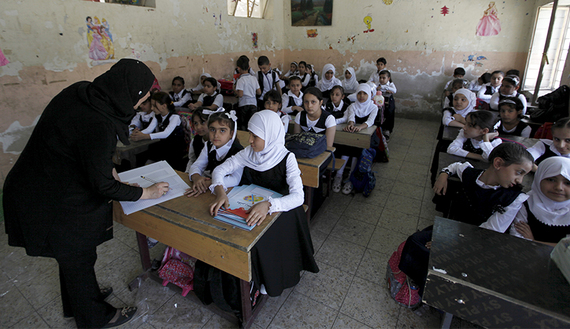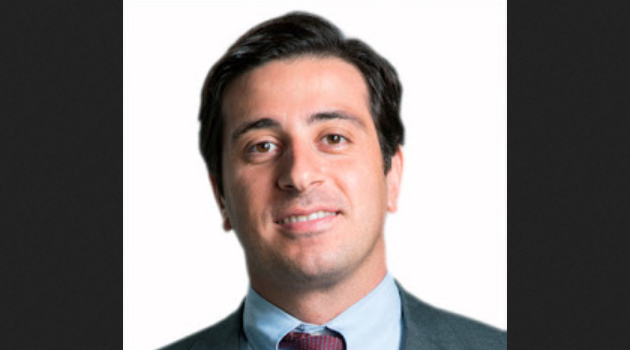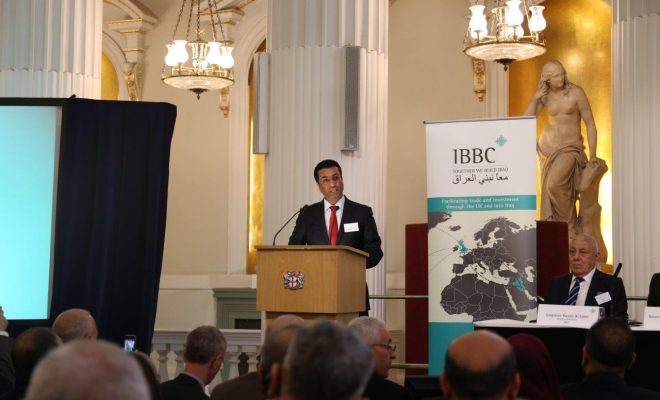IBBC’s 5th Annual Iraq Conference in Dubai – Opportunity in Adversity
The Iraq Britain Business Council (IBBC) was much praised at its conference on Thursday for pioneering in COVID-19 times by bringing together senior officials from Iraq, the UAE and the UK, prominent international and Iraqi businessmen, bankers and professional advisers as speakers and over 100 delegates.
With the Address Hotel as host venue implementing the strictest hygiene regime and using video links, delegates enjoyed a day of vigorous analysis and debate about the issues currently creating the adverse conditions dominating the Iraqi political and business landscape and what measures were needed to improve matters, but nevertheless inspirational presentations highlighted success stories across a number of sectors in panel sessions covering energy, finance, infrastructure/logistics and tech.
Highlights of the day were presentations made by Mrs Zena Yousif Iraq consul general in Dubai, the first woman to ever hold that position, and the fact that all the leaders of the energy companies presenting were Iraqi nationals for the first time ever, namely Mr Zaid Elyaseri, Vice President Iraq from BP, Mr Ali Al Janabi, Chairman, from Shell, Mr Musab Alkateeb, Managing Director, from Siemens Energy, and all were addressing common global issues currently affecting that sector – low oil and gas prices, environmental and green issues.
Mr Aziz Khudairi, Chairman of the Khudairi Group with multiple businesses in Iraq urged the Iraqi Government to embrace the private sector to grow prosperity in Iraq and to provide employment for the millions of young Iraqis, to protect Iraqi businesses from unfair dumping by foreign competitors, but in return emphasised the need for the Iraqi workforce to rediscover a work ethic so that Iraqi companies would become efficient and profitable.
Baroness Nicholson made her Welcome Address by video link from London and at the end of the day announced the new annual award to be made to an Iraqi SME for its contribution to business in Iraq, in memory of the recently deceased Engineer Rasmi al Jabri, IBBC deputy chairman.
Amongst the many excellent speakers were:
- H.E. Dr Thani bin Ahmed Al Zeyoudi, Minister of State for Foreign Trade, UAE
- H.E. Dr Abdulkariem Al Faisal, Chairman of the Prime Minister’s Advisory Commission
- Mrs Zena Yousif, Consulate General of Iraq in Dubai
- Mr Simon Penny, Her Majesty’s UK Trade Commissioner for the Middle East
Conference Sponsors were Basra Gateway Terminal, Siemens Energy and Serco.
Vikas Handa of Gulftek, Conference chairman said:
“Today’s IBBC conference in Dubai is the testimony of human resilience on the face of adversity. We had unexpected turnout & great participation from the ministers, industry leaders and businesses from Iraq, UAE & UK.
“We covered a lot of ground to chart the way forward, network & learn from each other. I along with IBBC MD Christophe Michels would like to thank our key members for their unwavering support to make it happen.“
In parallel
The Tech Forum took place online, with participants from Iraq, UK, Dubai and France, to review and discuss the digitisation of Iraq, based on the World Bank’s Report in April.
Chaired by Ashley Goodall of IBBC, we reviewed how the Government of Iraq ( GOI ) and digital development in general has been evolving since April, as Alexandre Laure, the World bank Sector specialist, who wrote the report – shared with us areas of development : namely, 6 key areas : Digital inclusion, banking and finance, Investment, Infrastructure, SMEs and start-ups, skill development and linking to external digital organisations. Two areas of progress include the establishment of a Tech fund for start-ups and SME investment, and the payment of Government salaries directly to bank accounts digitally. Additionally, there are areas of deregulation for start -ups and new businesses, although the registration cost of $37500 was deemed exclusionary for most start-ups.
Jawad Abbasi of GSMA MENA said that 4G infrastructure is critical in extending internet across Iraq, and this has been put on hold for the moment. This would increase the ability of users to trade, exchange and create new products on-line, as well as boost the digital economy. Yazen Altimimi CEO of Zain Cash echoed this issue as Zain are often blamed for poor internet experience, when it’s an infrastructure issue. Zain’s consumer uptake is rapid and there is a healthy growth and interest in the digital economy as a business and consumer medium. If 4G can be delivered the economy will see a rapid upswing. In short there is pent up demand and an appetite from consumers to transact on- line, so it makes sense to deliver 4G to ensure the whole economy expands.
Laura Oliver, director of Iraq Tech Ventures, amplified the issue for start -ups and SME.s who want to trade on line, and the raised the issue of the high cost of registration that prohibits start-ups registering formally, and therefore rely on the cash economy, so they are unable to get formal credit and investment. These two issues, of 4G and registration should be straight forward to address and would make a big different to the overall digital development of the Iraqi economy, and encourage investment from external digital companies like Facebook, Amazon and Google.
In a second panel: Online Consumer behaviour, Caroline McGarr of ThinkBank – a leading research agency in Irbil, presented key finding among Iraqi consumers between 18-45, and again found a big demand for consumer goods, banking on line for an unbanked 83% of the population. In sectors such as Fashion, health and social media there is enormous pent up demand as over 50% of these people spend over 5 hours a day on-line. Again, the issue of reliable internet, useful apps and products to purchase and reliability of banking, echo the first panel’s concerns.
The overall message from both panels is that there is huge unmet demand among youthful Iraqi’s for more services, better internet, better banking (trust) and online interaction with Government and products that will be better served by better internet and the proliferation of new goods and services from SMEs and start-ups, who themselves are constrained by registration fees and investment.
A full video of the sessions, including the presentation charts can be viewed here
For more information please contact london@webuildiraq.org
(Source: IBBC)
The post Successful IBBC Conference in Dubai first appeared on Iraq Business News.








